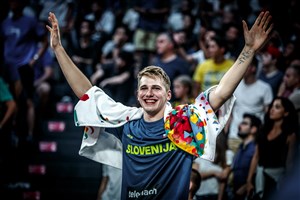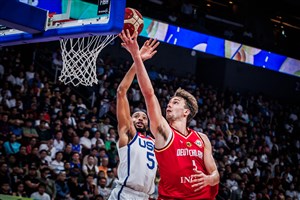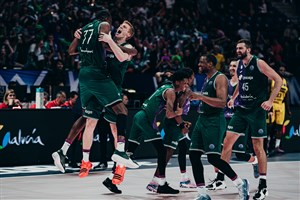
How Nigeria changed the course of AfroBasket history five years ago
LEEDS (Julio Chitunda's African Message) - On Sunday, August 30, 2015, the day began much like any other in Rades, Tunisia, but for anybody following or involved in the FIBA AfroBasket that year it wasn't an ordinary day, history was about to be made.
Two major events were at stake at the Salle Omnisport de Rades on that Sunday evening: The Angolans were seeking a two-peat AfroBasket title for the first time since 2009, while the Nigerians were defying the course of history and they did everything in their power to win their long-awaited first African Championship title.
🇳🇬🏆 Exactly 3 years ago, Nigeria made history when they became Africa Champions for the 1st time ever!#TBT #AfroBasket2015 @nbbfonline pic.twitter.com/hzdpafmIrO
— FIBA (@FIBA) August 30, 2018
Nigeria and Angola reached the Championship Game with a similar 5-1 mark each as both teams tasted defeat in the Group Phase, which in all fairness, worked out as wakeup calls for the two title contenders for the remaining of the tournament.
Early in the tournament Angola lost to Senegal while Nigeria fell to hosts Tunisia in the Group Phase, but both teams stepped up when it mattered most to reach the most important of the tournament.
Beating hosts Tunisia in a low-scoring semifinal contest (58-51) in front of a record 11,500 crowd, most of whom were home fans, seemed a strong statement from the Angolans. And it was a real warning to Nigeria, a team they had beaten eight times in as many AfroBasket matchups dating back to 1987.

However, the Nigerians - who advanced to the title game on the back of an 88-79 semifinal victory over Senegal - were unimpressed. Everything that really mattered to the team that reached the AfroBasket finals four times previously, was to avoid yet another Second-Place finish in the history of the competition since 1997.
How exactly did Nigeria change the course of AfroBasket history?
Desperation, determination, and more importantly, team spirit played a huge part in the Nigeria's first-ever African title.
Despite a 70-59 defeat to Tunisia early in the tournament, Nigeria crushed Uganda, Central African Republic, Mozambique and Gabon with an average margin-win of 28.5 points per game although that mark dropped to nine points in the semis and final.
And even though the Angolans dominated the opening ten minutes, they seem to have run out of gas when it mattered most, allowing Nigeria to cruise to a comfortable 74-65 triumph.
In the absence of Ike Diogu, who got hurt a few days before the tournament, it's undeniable how Chamberlain Oguchi and Olaseni 'Shane' Lawal propelled Nigeria to glory.
For most of the 11-day AfroBasket 2015, Oguchi became the go-to man offensively, burying threes after threes.
The lethal shooting guard sparked the Nigerian offense in the semifinal with a tournament-high eight tree-pointers against legitimate title contender Senegal.
Lawal, on the other hand, with the support from Al Farouq Aminu, ruled the Nigerian defense with some critical block shots. Obviously, Nigeria's team effort was key to their historic win, but Oguchi and Lawal set themselves apart.
And it came as no surprise that Oguchi ended up being named the 2015 FIBA AfroBasket Most Valuable Player.
But what really ignited Nigeria in the AfroBasket 2015 title game wasn't so much Oguchi who scored ten of his team-high 19 points from the free-throw line, rather, it was Nigeria's aggressive defense.
While Angola finished with a higher Field-Goal percentage of 34 against Nigeria's 29, the eventual champions out-rebounded Angola 60-37, and to seal the deal they forced Angola to turn the ball over 17 times.
Obviously, coach Will Voigt, who would eventually switch to the Angolan bench two years later, and his assistant played a huge part in attacking Angola's weak points.
There hasn't been a two-peat African champion since Angola's 2009 title. Tunisia lifted the trophy in 2011, Angola claimed their 11th continental in 2013, Nigeria's first gold came in 2015 and as hosts Tunisia won the trophy for the second in their history in 2017.
Julio Chitunda
FIBA
FIBA's columnists write on a wide range of topics relating to basketball that are of interest to them. The opinions they express are their own and in no way reflect those of FIBA.
FIBA takes no responsibility and gives no guarantees, warranties or representations, implied or otherwise, for the content or accuracy of the content and opinion expressed in the above article

















